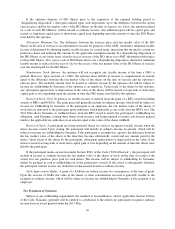Symantec 2016 Annual Report Download - page 40
Download and view the complete annual report
Please find page 40 of the 2016 Symantec annual report below. You can navigate through the pages in the report by either clicking on the pages listed below, or by using the keyword search tool below to find specific information within the annual report.If the optionee disposes of ISO Shares prior to the expiration of the required holding period (a
“disqualifying disposition”), then gain realized upon such disposition, up to the difference between the option
exercise price and the fair market value of the ISO Shares on the date of exercise (or, if less, the amount realized
on a sale of such ISO Shares), will be treated as ordinary income. Any additional gain will be capital gain, and
treated as long-term capital gain or short-term capital gain depending upon the amount of time the ISO Shares
were held by the optionee.
Alternative Minimum Tax. The difference between the exercise price and fair market value of the ISO
Shares on the date of exercise is an adjustment to income for purposes of the AMT. Alternative minimum taxable
income is determined by adjusting regular taxable income for certain items, increasing that income by certain tax
preference items and reducing this amount by the applicable exemption amount. If a disqualifying disposition of
the ISO Shares occurs in the same calendar year as exercise of the ISO, there is no AMT adjustment with respect
to those ISO Shares. Also, upon a sale of ISO Shares that is not a disqualifying disposition, alternative minimum
taxable income is reduced in the year of sale by the excess of the fair market value of the ISO Shares at exercise
over the amount paid for the ISO Shares.
Nonstatutory Stock Options. An optionee will not recognize any taxable income at the time a NSO is
granted. However, upon exercise of a NSO, the optionee must include in income as compensation an amount
equal to the difference between the fair market value of the shares on the date of exercise and the optionee’s
exercise price. The included amount must be treated as ordinary income by the optionee and will be subject to
income tax withholding by Symantec if the optionee is an employee. Upon resale of the shares by the optionee,
any subsequent appreciation or depreciation in the value of the shares will be treated as long-term or short-term
capital gain or loss depending upon the amount of time the NSO shares were held by the optionee.
Restricted Stock Units. In general, no taxable income is realized upon the grant of a RSU award (including
awards of PRUs and PCSUs). The participant will generally include in ordinary income, which will be subject to
income tax withholding by Symantec if the participant is an employee, the fair market value of the shares of
stock that are delivered to the participant upon settlement, which generally occurs at the time the RSUs vest. The
2013 Plan allows Symantec to withhold shares from the RSU award to satisfy the participant’s withholding tax
obligation, with Symantec retiring those shares from issuance and being required to tender cash from its general
funds to the applicable tax authorities in an amount equal to the value of the shares withheld.
Restricted Stock. A participant receiving restricted shares for services recognizes taxable income when the
shares become vested. Upon vesting, the participant will include in ordinary income an amount, which will be
subject to income tax withholding by Symantec if the participant is an employee, equal to the difference between
the fair market value of the shares at the time they become substantially vested and any amount paid for the
shares. Upon resale of the shares by the participant, subsequent appreciation or depreciation in the value of the
shares is treated as long-term or short-term capital gain or loss depending on the amount of time the shares were
held by the participant.
If the participant makes an election under Section 83(b) of the Code (“83(b) Election”), the participant will
include in income as ordinary income the fair market value of the shares of stock on the date of receipt of the
award, less any purchase price paid for such shares. The income will be subject to withholding by Symantec
(either by payment in cash or withholding out of the participant’s award). If the award is subsequently forfeited,
the participant will not receive any deduction for the amount treated as ordinary income.
Stock Appreciation Rights. A grant of a SAR has no federal income tax consequences at the time of grant.
Upon the exercise of SARs, the value of the shares or other consideration received is generally taxable to the
recipient as ordinary income, which will be subject to income tax withholding by Symantec if the recipient is an
employee.
Tax Treatment of Symantec
Subject to any withholding requirement, the standard of reasonableness, and (if applicable) Section 162(m)
of the Code, Symantec generally will be entitled to a deduction to the extent any participant recognizes ordinary
income from an award granted under the 2013 Plan.
30
























